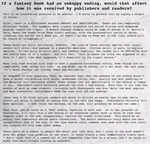Anushia Kandasivam
Vin stands out to us at the Pixel Project because she went through a lot of abuse in her young life, physical and psychological, at the hands of family and people that she should have been able to trust. She is a survivor, and with the help of her new friends she eventually finds self-worth, she realizes she can overcome her past trauma, she grows as a person. The question is, why did you decide to write a character with this kind of background, and what kind of research did you do to write the character who is an abuse survivor?
Brandon Sanderson
Yeah. So, two part question. First up: How and why did I decide. There are two main parts to this. One is, I knew I was writing in the world of Mistborn, a very less than perfect society. Let's just put it at that. The pitch for myself was, what if Sauron had won? What if you had to grow up in Mordor? I felt that if I had a character who was untouched by that, that the story would lack sincerity. If the only main character was someone who had somehow avoided that, there would be a certain-- like I said, lack of sincerity. There would be a certain, sort of-- I feel that, when you're writing stories, one of the things you should be looking to is to let characters who are part of a problem, solve the problem, rather than people outside the problem coming in to fix the problem. It's generally stronger storytelling, and generally more respectful of people who have had these life experiences themselves. So, I knew I needed someone who had been through a lot of trauma, because of the things we needed to change in this society.
The other part about it was planning-- I am an outliner, with my plots and my worlds and my characters, I discovery write. And oftentimes, what I'll do when I start a book is I'll start with multiple attempts at writing a person into that world. It's almost like I have a bunch of actors come in and try out for the part. I wrote three very different first chapters for that book, and the one that worked was the Vin you ended up with. What drew me to her as a character was the mix of strength and vulnerability at the same time, that she has. It's hard to explain why I came up with that, because really, as a writer, you're just kind of searching for someone whose voice works and whose soul matches that of the story. And it gets very mystical, for me, when you talk about characters, which I don't like, I like to be able to break things down, and talk about how it works and why I made the choice I did. But I made the choice of Vin because Vin was right. Part of that was, she was solving a problem that she had been directly-- that had directly affected her life.
How did I go about doing it right? This is where the best research that I get is reading the stories of people who are willing to share them with the rest of us. Reading firsthand accounts from people who are willing, because that takes a lot of bravery. It takes a lot of-- it's not something I could ever ask anyone to do, but it is something that people offer. On their blogs, and on forums, and spending your time listening to what people say, and trying to get the characters to express the way that these people would express it if they could write that character in their story, is one of my main goals. In fact, I think that's my prime mandate as a writer, is, try to write the characters like the people who have their life experience or beliefs would write them if they had my skill as a writer. And, so I spent a lot of time on blogs, I spent a lot of time on forums, and I wasn't ever posting on these, I was just listening. And then I made sure I had some good readers. Shallan has gone the same way. I can directly credit some very helpful beta readers who have had life experience similar to Shallan's, which have made sure, at least I hope I do this right, and always do better, that I'm walking a line between not sensationalizing, and not glorifying, but using this person's life experience to help them become the person that they want to become.
Anushia Kandasivam
And is that why we don't learn about the characters abuse on screen-- it's never on screen, it's always in their thoughts-- did you purposely write it like this because you didn't want...
Brandon Sanderson
Yes. This was very, very conscious. I feel like one of the biggest traps that writers in fantasy fall into, is using abuse of women, specifically, but all people who are in positions of lacking power, as a means of proving how bad your villains are, or how heroic your heroes are. I think that there are certain authors who are really good at doing this without making it a sense that this is how the world is. So it's not me pointing fingers and saying you shouldn't do that, but I felt that if I was to put it on screen, I don't think I could handle it without sensationalizing it. And by making it there, but never explicit, I think everyone knows it was there, I think everyone knows that Vin suffered abuse, but I could write a story that can deal with overcoming these things without having to sensationalize the thing itself.

